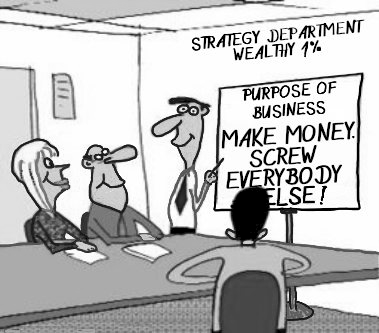0 Why the purpose of business affects you.
- Society
- by Adrian Mark Dore
- 19-02-2023

This statement may appear obscure and of little interest to you. After all, who cares about the purpose of business? It certainly won't top most philosophically minded people's to-do lists, but perhaps it should. I'm sure it's on the list of those concerned with our socioeconomic and environmental problems.
Some may think there are more profound and interesting questions to answer. There are, but the most fundamental consideration is how we sustain and provide for ourselves. Our employment provides the means to sustain us, and business provides employment. Therefore, the purpose of business must be one of the most basic and important questions we should consider, as it affects us all.
Milton Friedman, a founding father of neoliberalism (or free market economics) and a Nobel laureate, described the purpose of business as “serving the needs of shareholders as the sole purpose of business.”
I need not remind you that we live under the yoke of free market economic policies and, thus, under Friedman’s narrow and almost incomprehensible belief in the purpose of business.
In our modern and enlightened era, to think that the sole purpose of business is to serve shareholder needs is incomprehensible. To have thought this fifty years ago is equally unfathomable. How stupid can we be to make the world’s resources available to business so that only shareholders may benefit? That’s absurd, but it doesn’t end there. We reward this absurdity with a Nobel prize for economics. The highest accolade for an idea that calls for rules and regulations protecting us and the environment to be removed so shareholders may exploit and plunder these resources.
Surely, we can’t be that stupid to believe that this unfair and imbalanced practice would not cause serious social and environmental harm. Perhaps they could not have perceived the full extent of the damage, but not to have realised it would cause serious damage is nonsense. I leave it to your good judgement to determine their motives in supporting the incomprehensible.
Peter Drucker, often referred to as "the founder of modern business management", said the purpose of business is to create customers. Again, this is an important issue in sustaining business. Some people have taken the two ideas of "shareholder reward" and "customer satisfaction" and combined them, claiming that they make up the purpose of business. They say, "the fundamental business purpose requires a business to use revenues and capital to produce customer satisfaction to reward capital providers." Yes, we need to reward capital providers and customers for business to succeed, but what should be equally obvious is that they are not the only stakeholders in business. Other stakeholders contribute as much, if not more. The environment provides the raw materials, without which nothing happens. Society provides labour, who, without their knowledge, diligence, and skills, nothing happens. If we don't reward all stakeholders over the long term, business will fail.
In determining the real purpose of business let's return to Peter Drucker, who said: "the purpose of business lies in society, since a business enterprise is an organ of society." He got that part right. Building on the idea that business is an organ of society, we can conclude that the purpose of business must be to serve the interests of society. For a business to survive, it has to reward all constituents or stakeholders - that's just plain obvious. The rewards or benefits it must pay each stakeholder varies. Profit for shareholders, wages, job security and satisfaction for staff, protection and nurturing of the environment for the environment, etc.
From the perspective of each stakeholder, including shareholders, their rewards may appear to be the purpose of business. It's certainly the purpose or reason they entered or became involved in business. In ensuring all stakeholders and shareholders are rewarded according to their contribution, there will be conflicts of interest amongst constituents. To resolve these conflicts, we must turn to the real purpose of business, which is to benefit society. Therefore, decisions should be framed in language like this: "what outcome best serves the interests of society without unduly denying other constituents of their just rewards?" This acknowledges the relationship between society and the environment; we cannot destroy what sustains us. We need to protect all life on earth. Right now, we frame our decision-making in a different language - "what best serves shareholder interest?" No wonder we are in such a mess.
Now that we understand the purpose of business, we have to correct the massive imbalances in our economy. We need to change our inadequate and inappropriate business measurement standard so that we can measure and manage all stakeholder interests to make informed decisions. Only when we introduce a balanced measurement standard will we be able to make informed decisions which best serve society, thus achieving the true purpose of business. See my article "Economic Apartheid is caused by the Accounting Model" for more details.
Major social and environmental changes will only happen when we align business objectives with those of society and the environment.
This misalignment lies at the heart of our problems. That's why knowing and agreeing on the purpose of business is so important.
What I've said here is nothing new. Frankly, it's just plain common sense. So why does there appear to be some confusion as to the purpose of business? It's not because business leaders don't know. It's because the wealthy one per cent want to mislead us and confuse the issue. They don't want to change. They want Milton Friedman's "half-baked" ideas to prevail, not because they are correct, but because they serve their narrow interests well.
You may read other articles by Adrian Dore on Medium at